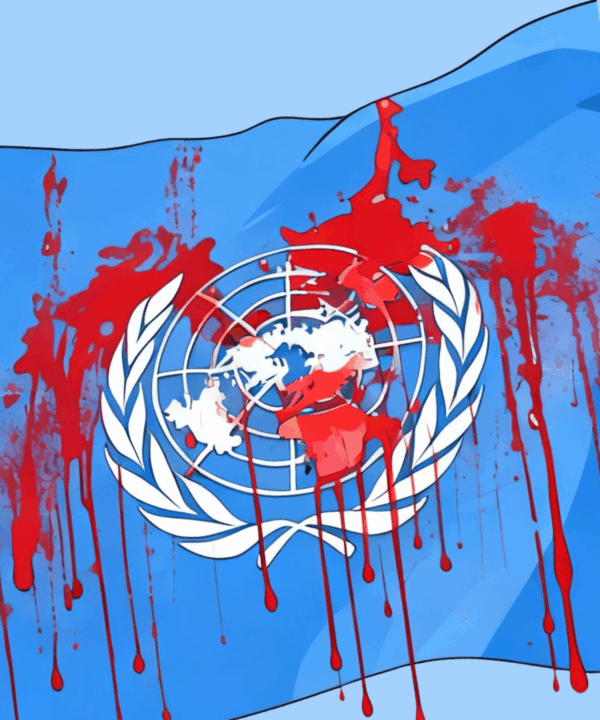 1945 was a moment of great hope, and great peril. A mere quarter century after the close of what had then been known as the “War to End all Wars,” Europe had, for the second time, been the epicenter of an even more destructive military conflict. In the wake of the Great War, the League of Nations had been founded precisely to stave off another clash of the same scale; humiliated by the ineffectual weakness of this institution, the leaders of the world realized that they could not afford another failure.
1945 was a moment of great hope, and great peril. A mere quarter century after the close of what had then been known as the “War to End all Wars,” Europe had, for the second time, been the epicenter of an even more destructive military conflict. In the wake of the Great War, the League of Nations had been founded precisely to stave off another clash of the same scale; humiliated by the ineffectual weakness of this institution, the leaders of the world realized that they could not afford another failure.
Moreover, the long shadow cast by the mushroom clouds over Hiroshima and Nagasaki darkened the uneasy peace that emerged in the war’s aftermath. The defeat of the Axis powers coincided with the dawn of both the Cold War and the age of nuclear weapons. As such, the West’s post-war optimism was actually a mood constantly strained by the looming threat of total destruction. In 1950, the American novelist, William Faulkner, summarized the tense, psychic state of the world in his Nobel Prize address: “Our tragedy today is a general and universal physical fear…There are no longer problems of the spirit. There is only the question ‘When will I be blown up’?”
On October 24, 1945, the United Nations was founded. Its highest and most obvious aspiration was to prevent another global military conflict by binding the family of nations to mutually recognized norms. The promise was a new era of international cooperation and universally acknowledged human rights. Through an institution which would be both more credible and powerful than the League of Nations, it embodied the great hope that world peace might be achieved. The strong claim that the UN can make for its success, therefore, is the fact that, in the eight decades since its inception, there has been no Third World War, and no subsequent use of nuclear weapons on the battlefield.
It is not lightly, then, that, on the 80th anniversary of its founding, we assert that this institution has run its course. Noble though its initial purpose may have been, the United Nations has, for a long time, done much more harm than good. The very body inaugurated to prevent global war has become the vehicle for the creeping advance of a destructive, anti-human agenda that now poses as great a threat to the world as the clash of nuclear powers. In fact, it is precisely its position as an apparently neutral above-the-fray broker of peace and universally-agreed-upon values that has enabled the institution itself, and its many agencies and contracted agents, to become such a destructive weapon in the hands of capable, motivated, and maniacal ideologues.
Examples of the evil perpetrated under the cover of this organization’s high-minded ideals are almost too numerous to name. Since the early 1960s, its “World Population” conferences have relentlessly pushed the pseudoscience of alarmist Neo-Malthusian ideology into binding international frameworks. The push towards a coerced consensus on euphemistic language that expanded access to abortion and contraceptives ensured that countries which would otherwise oppose such expansions on moral grounds could resist only at the cost of much-needed humanitarian aid. Thus has the very body that should have restrained larger powers from impinging on the independence of smaller states has itself become the means by which a surreptitious subversion of sovereignty has occurred.
The UN’s climate conferences have been even more effective at pushing the same anti-life ideology that sees the human person—and the family unit in which it flourishes most fully—as the root cause of the world’s problems. With every newly announced set of accords regarding the imagined menace of climate change, the countries of the Western world are further enmeshed in iniquitous legal and rhetorical systems that require the self-destructive policies of “de-growth.” Thus, have bureaucrats foisted their own agenda on the polities of the West by constraining the very set of choices in which their democracies are able to operate, given the fact that so few world leaders openly oppose the UN’s pernicious and insidious climate policies.
Indeed, an observer might be forgiven for thinking that the bureaucrats who staff the agencies of the UN—from the World Health Organization to UNICEF to the United Nations Fund for Population Activities—are more powerful than the elected politicians of so-called free countries; in any case, they certainly have more say in the affairs of nations than the citizens themselves. What’s more, these usurping agencies deploy a host of non-government organizations (NGOs) to further their cruel, anti-human depopulation policies. Unleashing the likes of Planned Parenthood and Marie Stopes upon the unborn children of nations who need actual assistance, not infanticidal purges, is an act of subjugation, not support. Far worse than the agencies themselves, then, are the NGOs that they empower—agencies even less accountable than the bureaucrats who enlist their services.
Taken together, the charges that must be laid at the feet of the UN are heavy, indeed. The bureaucrats who set the policies of these agencies and the subordinates who enact them have repurposed an institutional framework intended for peace; they now use it to drive forward a cruel, anti-human agenda—one which has accelerated the population collapse which their own bodies now obfuscate, distort, or deny. They have enacted a “colonialism of values,” imposing their own will on weaker nations which adhere to traditional moral norms. And they have subverted the democratic processes of the West, and bound them to suicidal trajectories of energy poverty and depopulation.
Eight decades is surely enough time to judge whether an institution is making good faith errors while finding its way or whether it is, in fact, a clear force for evil in the world. There can be no doubt that, whatever its founding aspirations may have been, the United Nations has inflicted—and continues to inflict—great harm on the world: it has subjugated the nations it ought to have united, and has “curbed” the populations of the people it ought to have protected. Indeed, a cynic might note a strong resemblance between this body and the supranational socialist congresses that cropped up in the 20th century to facilitate the transition from liberty to oppression.
Insofar as the UN has demonstrated a similar ambition and overall character, it is past time to recognize this organization for what it is, to demand its dissolution, and to repudiate all of the treaties to which member states, including Canada, has been bound. Although the dangers of this world are many, the only solutions that the UN now offers are much worse than the diseases it pretends to treat. We should meet the challenges of our present moment as a people empowered to choose our own destiny, and not as the vassals of a faceless bureaucracy. For we can surely face the crises of our time—but not if the UN continues to hamper the free citizens of the world’s nations in the exercise of their self-government. Enough is enough. And, for the UN, eight decades is, beyond any doubt, more than enough.




